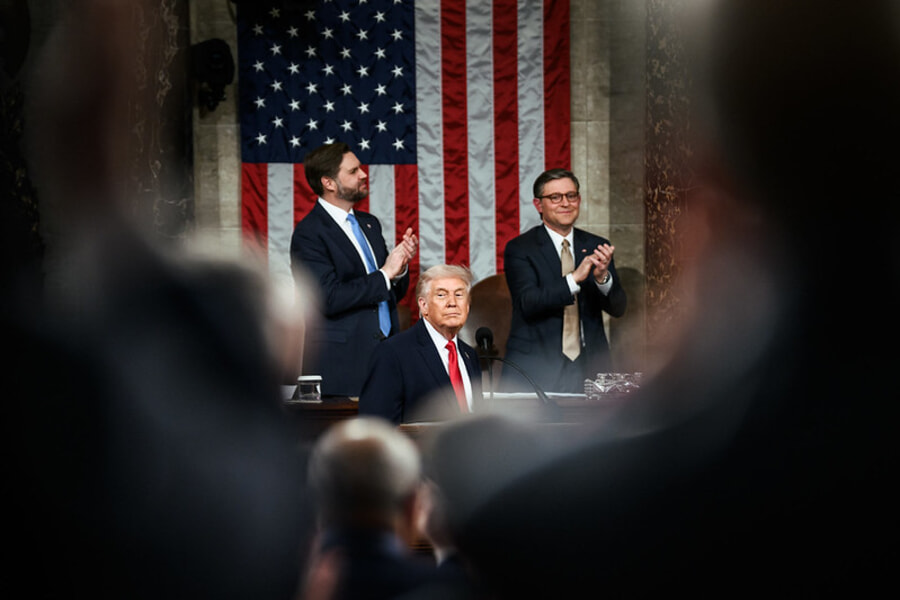Trump’s ‘Merit Hiring Plan’ Has a First Amendment Problem

The Trump administration has taken dramatic action to thin the ranks of the federal civil service, laying off workers outright and pushing them to resign using both carrots and sticks. These tactics have largely been calculated to circumvent the legal protections against arbitrary and politically motivated firing that most federal civil servants enjoy. But the administration is also seeking to erode those protections going forward. It has proposed, in defiance of the federal civil service laws, to make tens of thousands of federal employees fireable at will. More generally, the administration is arguing that the president has the constitutional authority to fire civil servants—even those protected by law—for any reason.
One of the administration’s stated aims is to shrink the federal workforce. But already, the administration has seemed to realize that it will need to replace some if not many of the civil servants that it has fired. Who will the administration hire to replace these workers? In May, it offered a clue with the release of its “Merit Hiring Plan,” which claims to “ensure that only the most talented, capable and patriotic Americans are hired to the Federal service.” Tucked into the plan is a seeming requirement that applications for a large swathe of federal jobs ask candidates how they would “advance the President’s Executive Orders and policy priorities” and direct them to “[i]dentify one or two relevant Executive Orders or policy initiatives that are significant to [them].”
The questions are plausibly read to make a job applicant’s political allegiance to President Trump a precondition to federal employment. And while the administration subsequently denied that these questions are tantamount to an “ideological litmus test,” that claim rings hollow. For instance, it was recently reported that the questions are in fact being used for—alarmingly—National Weather Service hires, and one analysis shows that the questions have already been added to thousands of federal job applications. Hiring civil servants based on their political affiliation, a practice often referred to as patronage hiring, violates the First Amendment.
This article digs into the Trump administration’s plan for politicized federal hiring, explains why it is unlawful, and then discusses some legal and factual hurdles those bringing suit over the plan might need to clear.
“Merit Hiring” in the Trump Administration
On the day of his second inauguration, President Trump signed Executive Order 14170, entitled “Reforming the Federal Hiring Process and Restoring Merit to Government Service.” That order directed administration officials to devise “a Federal Hiring Plan that brings to the Federal workforce only highly skilled Americans dedicated to the furtherance of American ideals, values, and interests.” The order specified that the plan should “prevent the hiring of individuals based on their race, sex, or religion, and prevent the hiring of individuals who are unwilling to defend the Constitution or to faithfully serve the Executive Branch.” And it called for “Department and Agency leadership” to be “active participants in implementing the new processes and throughout the full hiring process”—likely a move to consolidate political control over the hiring process.
The administration’s Merit Hiring Plan followed at the end of May. Across 30 pages, it outlined numerous changes to federal hiring practices, some of which were aimed at increasing the speed and transparency of the process, but several of which had a more partisan valence. For instance, the plan decried diversity, equity, and inclusion programs as “[i]llegal, demeaning, and immoral” and barred the use of “statistics on race, sex, ethnicity or national origin, or the broader concept of ‘underrepresentation’ of certain groups, in any hiring, recruiting, retention or promotion decisions.”
The Merit Hiring Plan also emphasized the importance of “Recruiting Patriotic Americans for Federal Service.” It directed “[a]gency leadership, or designee(s)” to “function as a hiring committee in the candidate selection process,” including by “conduct[ing] a final ‘executive interview’ to confirm organizational fit and commitment to American ideals.” And it announced that all applications for jobs at or above the GS-05 pay grade—an annual salary in the D.C. area of less than $50,000—would include a series of “short, free-response essay questions.” One of these questions would ask applicants, “How would you help advance the President’s Executive Orders and policy priorities in this role?” and instruct them to “[i]dentify one or two relevant Executive Orders or policy initiatives that are significant to you, and explain how you would help implement them if hired.”
This question immediately raised alarm. Rep. Stephen Lynch (D-Mass.), then acting ranking member of the House Oversight and Reform Committee, described it as a “blatant loyalty test.” “Such a loyalty test is antithetical to the concept of an expert, nonpartisan civil service,” he added, identifying classes of federal employees, like physicians at the Department of Veterans Affairs or Social Security claims administrators, for whom adherence to President Trump’s “policy initiatives” is irrelevant. Political scientist Adam Bonica characterized the Merit Hiring Plan as “ideological screening.”
While the administration subsequently tried to walk things back—disclaiming any intent to impose an ideological litmus test and, notwithstanding the Merit Hiring Plan’s mandatory language, asserting that agencies retain discretion in whether to use the essay questions—its intent to politicize hiring is clear. Repeated attacks by members and allies of the Trump administration on the traditional principles of the federal civil service confirm it. For instance, Russell Vought—director of the Office of Management and Budget and acting director of the remains of the Consumer Financial Protection Bureau—has pledged, in response to what he sees “as a complete Marxist takeover” of “the government apparatus,” to put federal employees “in trauma.” Vice President Vance called for “[e]very single midlevel bureaucrat, every civil servant in the administrative state” to be “replace[d] ... with our people.” And President Trump himself has railed against the people “actually running the country” as “the fascists, the Marxists, the communists” and “the enemy within.” “I will shatter the Deep State,” he promised during his campaign. That, he has specified, means purging “RINOs”—Republicans seen as insufficiently partisan—and “Democrats.” The Merit Hiring Plan is one of numerous initiatives the administration has launched to achieve these goals.
Patronage Hiring and the First Amendment
Wielding the Merit Hiring Plan’s essay questions as a political litmus test for job applicants is unconstitutional. The Supreme Court has held that “conditioning hiring decisions on political belief and association plainly constitutes an unconstitutional condition, unless the government has a vital interest in doing so.” No such interest is discernible here.
In Rutan v. Republican Party of Illinois, decided in 1990, a group of plaintiffs alleged that the governor of Illinois “ha[d] been using the Governor’s Office to operate a political patronage system to limit state employment and beneficial employment-related decisions to those who are supported by the Republican Party.” The Court found the policy unconstitutional and considered and rejected as legally insufficient a number of reasons put forward in defense of patronage. “A government’s interest in securing effective employees can be met by discharging, demoting, or transferring staff members whose work is deficient.” Nor was patronage necessary to advance the state’s interest in “preservation of the democratic process”—in fact, “patronage decidedly impairs the elective process by discouraging free political expression by public employees.” And “[a] government’s interest in securing employees who will loyally implement its policies can be adequately served by choosing or dismissing certain high-level employees on the basis of their political views.”
That last proviso bears emphasis. Both the First Amendment and the civil service statutes permit an administration to hire and fire senior officials based on their political affiliation. The existence of so-called political appointees in high government positions is uncontroversial. The Trump administration has sought to greatly expand that exception from the norm of nonpartisan hiring so as to sweep numerous junior and midlevel federal positions into the patronage system. But hiring career federal workers and not just “certain high-level employees” on the basis of politics, as the Merit Hiring Plan calls for, remains unlawful.
Not only does Rutan bar outright screening of job applicants based on their affinity for President Trump’s political agenda, but it also preempts the Merit Hiring Plan’s rationales. Neither an interest in “recruitment of individuals committed to improving the efficiency of the Federal government” nor a desire to hire “patriotic” candidates who will “help advance the President’s Executive Orders and policy priorities” can justify patronage. Indeed, nearly two decades ago, a government watchdog found that the Department of Justice repeatedly violated the law by making hiring decisions on the basis of political affiliation.
Taking Claims to Court
Despite the clarity of these legal principles, plaintiffs seeking to challenge the Trump administration’s Merit Hiring Plan will likely need to overcome certain hurdles.
For one thing, claims about the federal government’s personnel actions generally may not be brought in federal district court. Instead, they are typically “channeled” to the Merit Systems Protection Board (MSPB), a specialized administrative body tasked with adjudicating personnel claims by federal employees. Under the applicable statutory scheme, only after the MSPB acts may such claims proceed to a federal appeals court. The Trump administration has brought this review system to a halt by removing a member of the MSPB, depriving it of a quorum and therefore the ability to decide cases.
Channeling would likely complicate a challenge to the Merit Hiring Plan, but opportunities remain. An initial question is whether the most likely plaintiffs—disappointed job applicants—would be subject to channeling at all. As noted above, the federal civil service laws expressly send existing federal employees to the MSPB, but they do not say anything about claims by job applicants. A court could conclude that omission either reflects Congress’s intent that applicants be allowed to freely sue in federal court or that they are barred from bringing certain categories of personnel claims entirely. Nevertheless, some federal appellate case law holds that even federal employees generally deprived of judicial remedies by statute may bring constitutional challenges to personnel actions in federal court. Under that precedent, which rests partially on the Supreme Court’s long-standing recognition that a “serious constitutional question” would arise “if a federal statute were construed to deny any judicial forum for a colorable constitution claim,” job applicants may be able to argue their way around any applicable channeling rules.
Channeling, however, would likely limit would-be plaintiffs’ ability to raise in court other reasons why the Merit Hiring Plan is unlawful. For instance, under federal law, it is a “prohibited personnel practice” to “discriminate for or against any ... applicant for employment on the basis of ... political affiliation.” But that protection may only be enforced by a body called the Office of Special Counsel; President Trump removed the special counsel appointed by President Biden and is moving to install a loyalist in his place. In the meantime, the office has opined that including the Merit Hiring Plan’s essay questions on job applications would not constitute a prohibited personnel practice. A regulation of the Office of Personnel Management likewise provides that federal employment practices “must not discriminate on the basis of ... political affiliation.” And while job applicants are entitled to enforce that regulation, they may do so only before the (now-paralyzed) MSPB.
Challengers would also need to consider their factual allegations. The government would likely argue that the Merit Hiring Plan’s essay questions have no political implications at all and instead permissibly test an applicant’s interest in serving in the executive branch. And, as noted above, the Office of Personnel Management has issued “guidance” that answers to the essay questions will not be “scored or graded,” that applicants will not be “disqualified or screened out” if they do not answer the questions, and that agencies—“in their discretion”—may choose to leave the questions off of certain applications. In response, litigants can point to the surrounding context, surveyed above, confirming that the Trump administration meant what it said in the Merit Hiring Plan itself: The aim is to select employees who identify certain of “the President’s Executive Orders and policy priorities” as personally “significant” and who would “help advance” and “implement” them as such.
To survive a motion to dismiss, applicants might assert facts sufficient to plausibly allege one or more of the following three claims: first, that the Merit Hiring Plan is invalid on its face, as it constitutes a direction for agencies to engage in patronage hiring in all cases; second, that it is “overbroad” in the sense that it “chills” protected speech even if it might be constitutionally applied in some cases; or third, that the plan was actually applied by hiring agencies in ways that discriminate against particular job applicants on the basis of their political views or affiliations. Statements by President Trump and administration officials expressing their desire to purge the civil service of workers seen as insufficiently politically loyal will no doubt be relevant. So, too, may be other public reporting, records requests as to agency hiring policies, and testimony of government whistleblowers and job applicants. Investigations conducted by the Department of Justice Office of the Inspector General into politicized hiring during the George W. Bush administration show how analyses of patronage practices might be developed.
***
The Merit Hiring Plan is plainly calculated—if by wink and nod—to institute patronage hiring at federal agencies. Like other Trump administration initiatives to dismantle the nonpartisan civil service that Congress painstakingly developed over the course of a century, it is illegal. Those seeking to demonstrate its blatant unconstitutionality in court have options.






